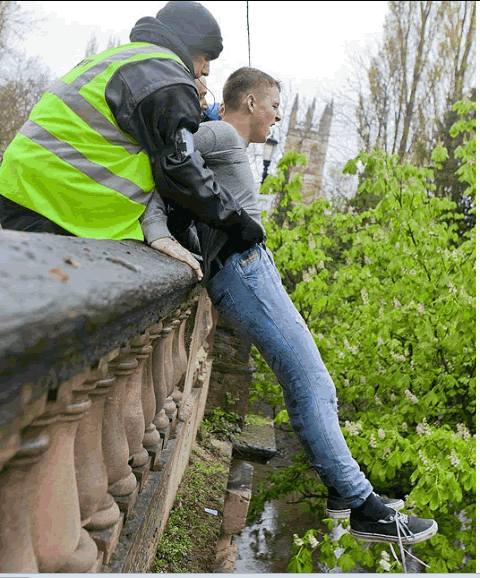
| EQI.org Home | America | England |
Other EQI.org Topics: Emotional
Intelligence | Empathy Search EQI.org | Support EQI.org
|
| From a UK based website "A growing child must of course defer to their parents better judgement, but there should be some areas of their lives that they can feel in control of. As a child grows, they naturally wish to express themselves, and decide things for themselves; they may have opinions on what they wear, what haircut they get, where they go and what they spend their time on." firstsigns.org.uk/what/invalidation |
"must of course defer" "may have opinions" |
| This is a small thing, but is perhaps a bit ymbolic of the British culture. The writer of the lyrics for the song Georgy Girl, a very invalidating song, was raised in England. (Jim Dale) |

A student reveller is suspended by his jeans as security guards stop him taking a May Day river plunge.

Dozens of Oxford University revellers attempted the traditional 25ft leap off Magdalen Bridge into the River Cherwell — many after a night of partying.
Jeremy Kyle - see also google searches page

The peerage is a legal system of largely hereditary titles in
the United Kingdom, which constitute the ranks of British
nobility and is part of the British honours system. The term is
used both collectively to refer to the entire body of noble
titles (or a subdivision thereof), and individually to refer to a
specific title (and generally has an initial capital in the
former case and not the latter). The holder of a peerage is
termed a peer.
In modern practice, no new hereditary peerages are created
(except for members of the Royal Family), but only life peerages
which carry the personal right to sit and vote in the House of
Lords. Peerages, like all modern British honours, are created by
the British monarch, taking effect when letters patent are
affixed with the Great Seal of the Realm. Her Majesty's
Government advises the Sovereign on a new peerage, under a
process which scrutinises appointments to political honours.
Currently a few hereditary peers, who are elected to represent
the others, also retain the right to sit and vote in the House of
Lords, as of 1 July 2011 only 90 members sitting by virtue of a
hereditary peerage remain.[1]
The Sovereign is considered the fount of honour, and as "the
fountain and source of all dignities cannot hold a dignity from
himself",[2] cannot hold a peerage